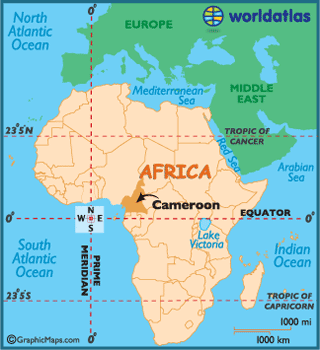November is turning into Crazy Work Month. Good thing I got my health back, because I have exposés (group presentations) coming up in a couple classes, and then exams (some before and some after Christmas - in case you didn't know, I'm staying here until the middle of January, so will be participating in the grand fête [party] de Noël [Christmas] here). Also, we're planning a voyage in western Cameroon next weekend, which exacerbates the time crunch. But, ça va aller.
I've been posting about my life here, but I realize that many of you probably don't know a whole lot about Cameroon. Well, we'll start with a map (I'm getting good at drawing maps of Africa and Cameroon from scratch, but when there is internet it is much easier):
 |
| http://www.worldatlas.com/webimage/countrys/africa/cm.htm |
As you know, Cameroon is in Africa. Central Africa. It is often called "Africa in Miniature" because the variation in climate and ethnicities is thought to be representative of Africa as a whole. The north is a more desert region, predominately Muslim, whereas the southern part of the country is more tropical. Yaoundé is in the center.
The history of Cameroon is fairly representative of Africa as well. It began primarily under German control (although always contested, because it's in a nice middle position geo-strategically, particularly with the important port of Douala). After the first world war, the Germans were chased from the territory, and France and Britain shared the country (although it was technically a mandate of the League of Nations, it was administered by France in the south and a small piece by the British in the west, who connected it with Nigeria). Pieces of everything! There is now a Francophone part and an Anglophone part, although the Francophone region is larger. However, the country is bilingual (as many people in the street or in taxis will tell me). Attending conferences, for example, everyone speaks either French or English, and is expected to understand both. This prevents the confusion that might arise from misspeaking in a language you are not yet a master of. I think this is great for the program: in Yaoundé, we speak French in class and with our families and have a real assimilation in the language, but if there is a medical problem or other emergency there are people who speak English. Also, the students all take English classes and I've found some good bonding time helping my brothers and sisters with their English homework.
Like many African countries, Cameroon hasn't had a great political record in terms of democracy and participation. I've talked a little about corruption before; November 6th marked the 30 year anniversary of the President Biya in power. Before him, there was only one other president after independence, 20 years in power. Examining why has to do with domineering colonial power structure being transferred to the new chef, and a host of other possible factors. What to do about it is even more complex: questions about removing recognition by Western powers, internal movements, both, or something else. This is not yet the space for that full discussion.
A quick note on the title of my blog: I am not really Francophone, because French isn't my maternal language. But, French is a goal of being here, and by the time I thought about it enough it was too late to change the title. In any case, I am indeed an American in Cameroon (although, working on being a Cameroonian in Cameroon).
I have another post coming soon. Cheers as ever!
No comments:
Post a Comment